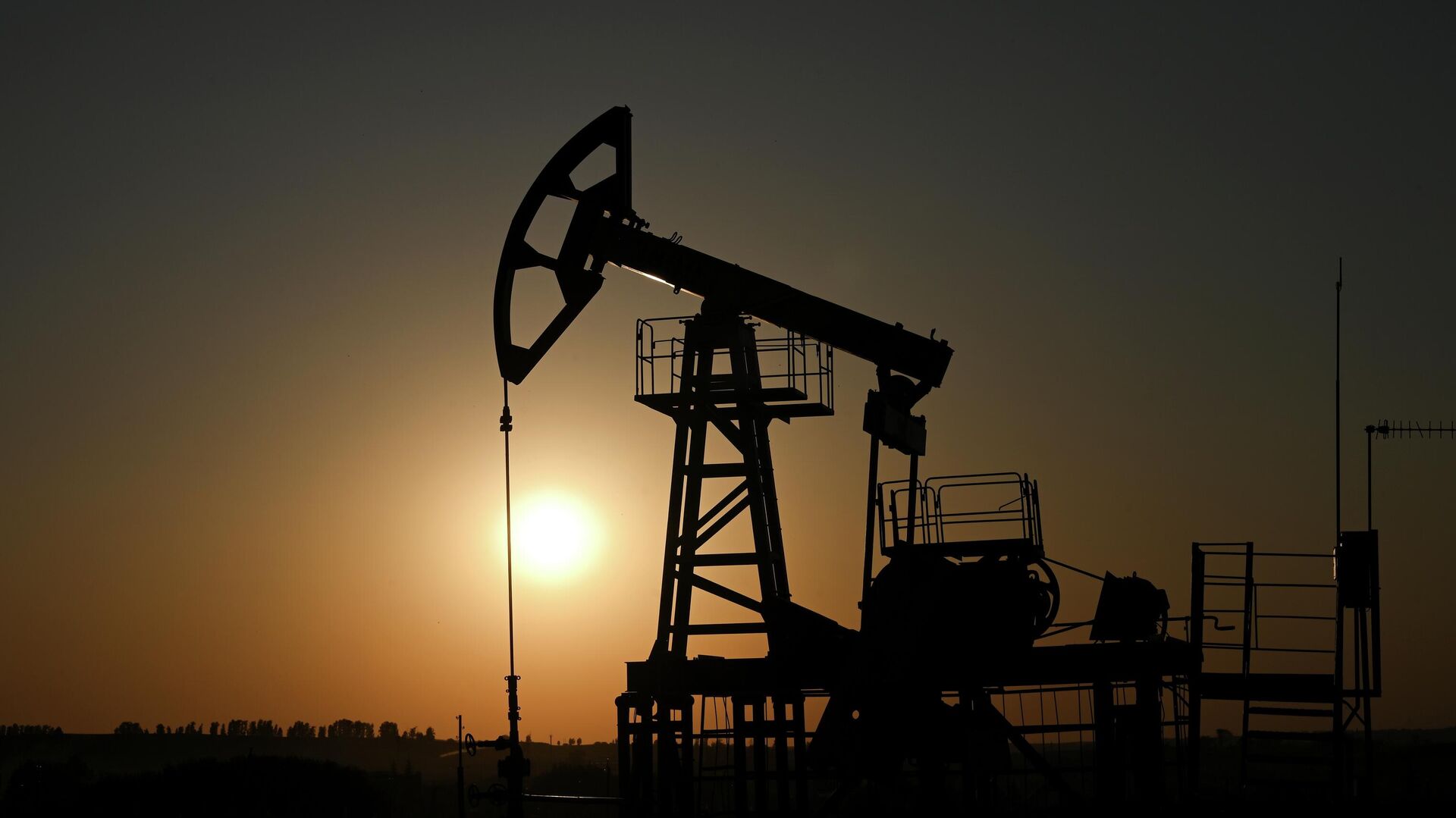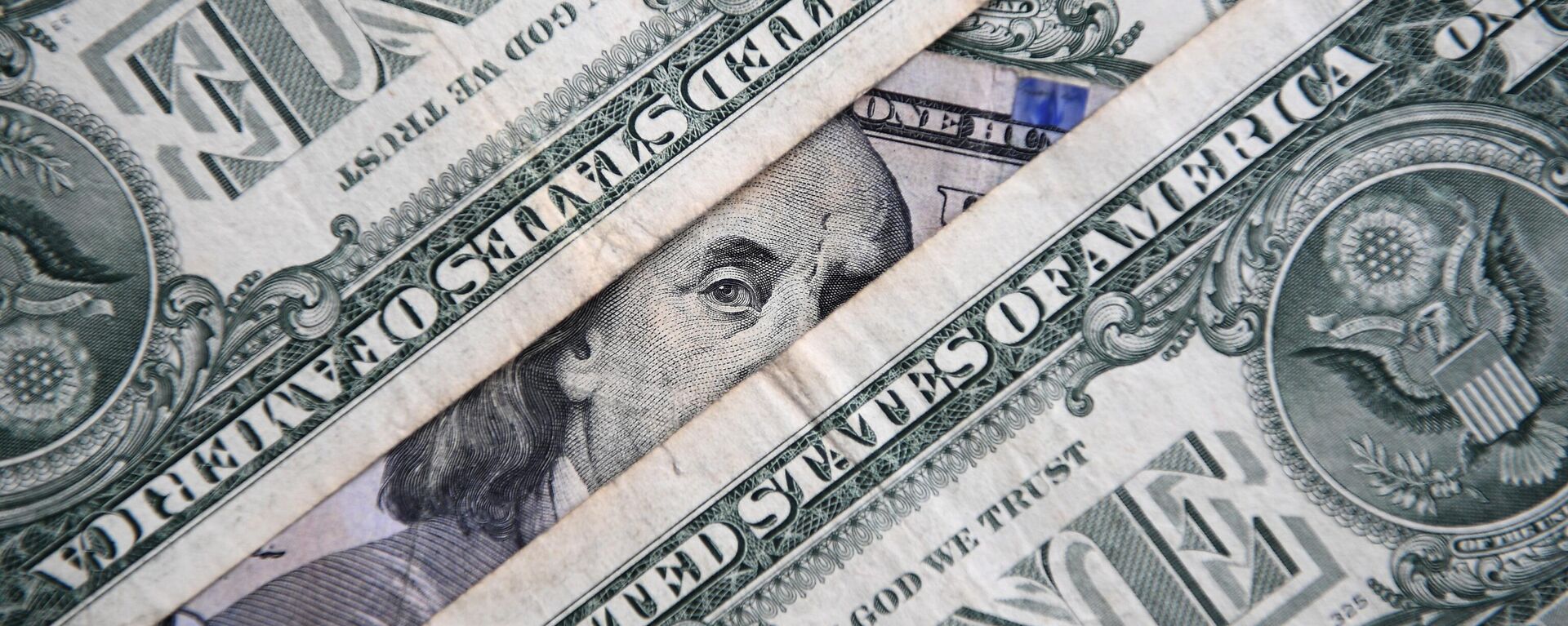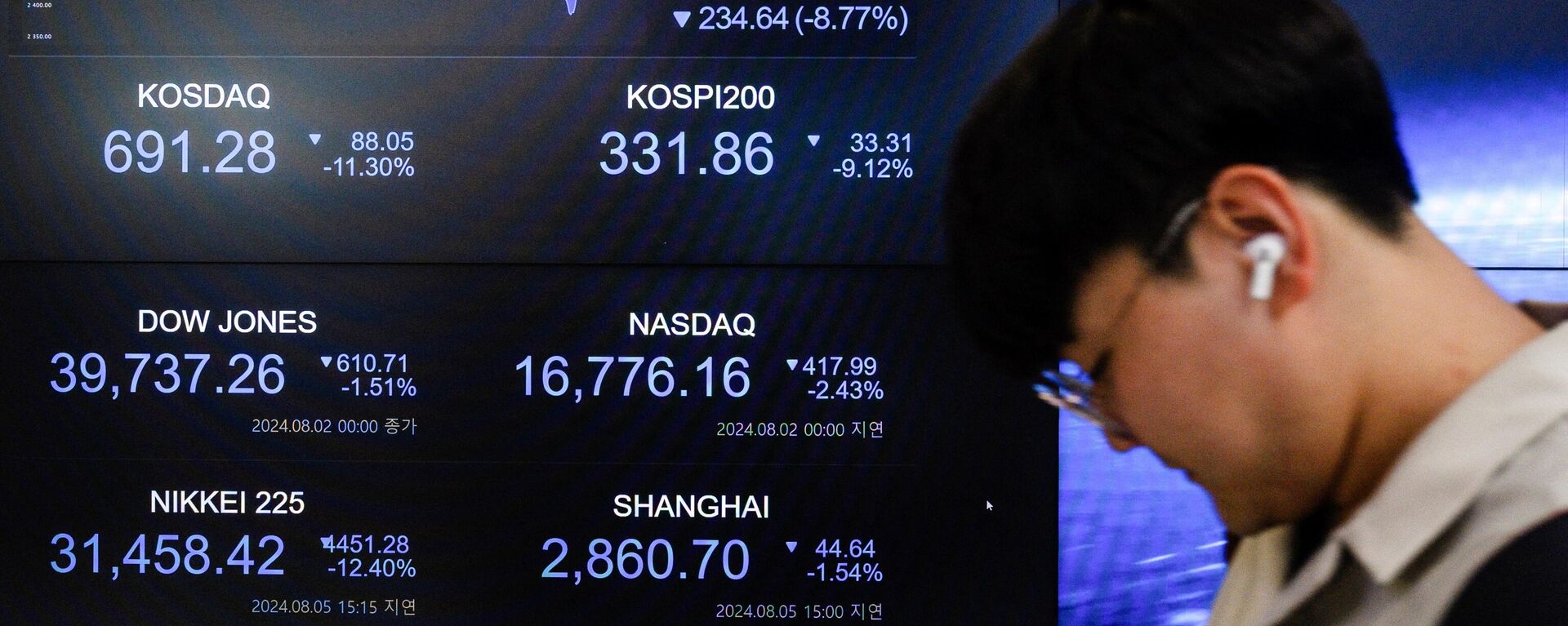https://sputnikglobe.com/20240806/oil-prices-attempt-reset-after-us-recession-fears-wipe-out-most-of-2024-rally-1119660801.html
Oil Prices Attempt Reset After US Recession Fears Wipe Out Most of 2024 Rally
Oil Prices Attempt Reset After US Recession Fears Wipe Out Most of 2024 Rally
Sputnik International
Crude prices perked slightly at Tuesday’s close, attempting a reset after the 2024 oil rally was mostly wiped out this week amid risk aversion across markets on fears of a US recession.
2024-08-06T20:55+0000
2024-08-06T20:55+0000
2024-08-06T20:54+0000
economy
us
wall street
business
karine jean-pierre
dow jones
white house
brent
oil prices
crude oil
https://cdn1.img.sputnikglobe.com/img/07e7/08/0f/1112614624_0:73:3050:1788_1920x0_80_0_0_4337ab083af350e13646a45edae6e32a.jpg
West Texas Intermediate (WTI) crude settled at $73.20 per barrel, up 27 cents, or 0.4%. On Monday, WTI sank to $71.69, its lowest since the week of February 2, when it plumbed $$71.41. For the year, the US crude benchmark remained up about 2.5%, versus its 2023 close of $71.65. Prior to a torrid selloff that began two months ago, WTI rose to as high as $87.67 in April, rallying 18% on the year at that time. UK-origin Brent crude ended Tuesday’s session at $76.48 per barrel, rising 18 cents, or 0.3%. Brent’s low on the prior day was $75.06, a bottom not seen since the week to December 29, when it fell to $74.79. Year-to-date, the global crude benchmark was down 0.7%, versus its 2023 closing price of $77.04. Brent reached $92.18 in April, rallying almost 20% at that point. Scott Shelton, a crude oil broker and client adviser at ICAP in Durham, North Carolina, urged for a closing of short — or bearish positions — in crude, saying he could not immediately foresee another huge oil price drop triggered by macro markets that included stocks, currencies, bonds and metals. But Shelton also cautioned against turning fully bullish on oil. “The issue for me is that I am not sure that now is the right time to get long either!” he wrote in his Tuesday note to ICAP’s clients. Worries about a potential US recession have grown since last week, after the Labor Department reported that non-farm payrolls grew by just 114,000 in July — the smallest since the jobs boom that began with post-coronavirus recovery period. US unemployment also rose to 4.3% in July, the highest since December 2021.White House Press Secretary Karine Jean-Pierre told reporters earlier Tuesday that despite some stock market volatility, the broader US economy effectively "remains resilient."Analysts remained wary about the turnaround though, saying they will believe it when they see the three key indexes for US stocks — the S&P 500, the Nasdaq Composite Index, and the Dow Jones Industrial Average — finishing the day comfortably in the green.At closing, the Dow rallied nearly 300 points as the S&P 500, which tracks stocks of the top 500 US companies, was up by 53.70 points. The technology-heavy Nasdaq Composite Index, which comprises pricey stocks such as Amazon, Apple, Netflix, and Google, spiked over 1% after settling down 3.4% in the previous session.
https://sputnikglobe.com/20240806/is-new-global-financial-crisis-round-the-corner-1119659623.html
https://sputnikglobe.com/20240805/why-did-the-global-stock-market-crash-and-who-is-to-blame---1119643785.html
wall street
Sputnik International
feedback@sputniknews.com
+74956456601
MIA „Rossiya Segodnya“
2024
Sputnik International
feedback@sputniknews.com
+74956456601
MIA „Rossiya Segodnya“
News
en_EN
Sputnik International
feedback@sputniknews.com
+74956456601
MIA „Rossiya Segodnya“
Sputnik International
feedback@sputniknews.com
+74956456601
MIA „Rossiya Segodnya“
state of crude oil prices, what happened in global markets, what caused markets to crash, us recession fears
state of crude oil prices, what happened in global markets, what caused markets to crash, us recession fears
Oil Prices Attempt Reset After US Recession Fears Wipe Out Most of 2024 Rally
NEW YORK (Sputnik) - Crude prices perked slightly at Tuesday’s close, attempting a reset after the 2024 oil rally was mostly wiped out this week amid risk aversion across markets on fears of a US recession.
West Texas Intermediate (WTI) crude settled at $73.20 per barrel, up 27 cents, or 0.4%. On Monday, WTI sank to $71.69, its lowest since the week of February 2, when it plumbed $$71.41.
For the year, the US crude benchmark remained up about 2.5%, versus its 2023 close of $71.65.
Prior to a torrid selloff that began two months ago, WTI rose to as high as $87.67 in April, rallying 18% on the year at that time.
UK-origin Brent crude ended Tuesday’s session at $76.48 per barrel, rising 18 cents, or 0.3%. Brent’s low on the prior day was $75.06, a bottom not seen since the week to December 29, when it fell to $74.79.
Year-to-date, the global crude benchmark was down 0.7%, versus its 2023 closing price of $77.04.
Brent reached $92.18 in April, rallying almost 20% at that point.
Scott Shelton, a crude oil broker and client adviser at ICAP in Durham, North Carolina, urged for a closing of short — or bearish positions — in crude, saying he could not immediately foresee another huge oil price drop triggered by macro markets that included stocks, currencies, bonds and metals.
But Shelton also cautioned against turning fully bullish on oil. “The issue for me is that I am not sure that now is the right time to get long either!” he wrote in his Tuesday note to ICAP’s clients.
Worries about a potential US recession have grown since last week, after the Labor Department reported that non-farm payrolls grew by just 114,000 in July — the smallest since the jobs boom that began with post-coronavirus recovery period. US unemployment also rose to 4.3% in July, the highest since December 2021.
White House Press Secretary Karine Jean-Pierre told reporters earlier Tuesday that despite some stock market volatility, the broader US economy effectively "remains resilient."
"What we’ve seen recently is consumers remain resilient and business investment remains strong, unemployment from 50-year lows is still low at 4.3 percent," she remarked during a press briefing after a measure of calm returned to Wall Street after the ferocious selloff of the past session that handed pricey US stocks their
worst day in almost two years.
Analysts remained wary about the turnaround though, saying they will believe it when they see the three key indexes for US stocks — the S&P 500, the Nasdaq Composite Index, and the Dow Jones Industrial Average — finishing the day comfortably in the green.
At closing, the Dow rallied nearly 300 points as the S&P 500, which tracks stocks of the top 500 US companies, was up by 53.70 points. The technology-heavy Nasdaq Composite Index, which comprises pricey stocks such as Amazon, Apple, Netflix, and Google, spiked over 1% after settling down 3.4% in the previous session.






